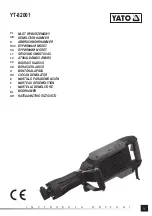
4
a.
Hold the power tool by insulated
gripping surfaces, when performing an
operation where the fastener may
contact hidden wiring.
Fasteners
contacting a “live” wire may make
exposed metal parts of the power tool
“live” and could give the operator an
electric shock.
b.
Use clamps or another practical way to
secure and support the workpiece to a
stable platform.
Holding the work by
hand or against your body leaves it
unstable and may lead to loss of control.
c.
Do not drive fasteners into existing walls
or other blind areas where electrical
wiring may exist.
If this situation is
unavoidable, disconnect all fuses or circuit
breakers feeding this worksite.
d.
Use only sockets designed for power
impact wrenches.
Sockets designed for
hand use may break under the load this
tool generates.
e.
Be certain to seat the socket completely
and securely on the output drive.
f.
Do not use worn or damaged sockets.
g.
Select the correct size sockets and keep
the inside of the socket clean.
h.
Do not allow a loose fastener to spin
freely within the socket. The fastener
may be thrown out of the socket.
i.
Use thick cushioned gloves and limit the
exposure time by taking frequent rest
periods.
Vibration caused by impact driver
action may be harmful to your hands and
arms.
j.
Remove battery pack before changing
accessories.
Accidental starting may
occur because battery appliances with a
battery inserted are in the operative
condition.
k.
Be prepared for a reaction torque when
“seating” or removing a fastener.
The
tool housing may tend to twist in the
opposite direction of accessory rotation
when “seating” or removing a fastener
depending on the torque setting of the
tool.
l.
Do not run the tool while carrying it at
y o u r s i d e .
T h e r o t a t i n g d r i v e c o u l d
become entangled with clothing and
injury may result.
m.
Place the tool onto the fastener only
when the tool is switched off.
Rotating
driver tools can slide off the fastener.
Safety Rules for Cordless Impact Wrenches
make a connection from one terminal to
another.
Shorting the battery terminals
together may cause burns or a fire.
d.
Under abusive conditions, liquid may be
ejected from the battery, avoid contact.
If contact accidentally occurs, flush
with water. If liquid contacts eyes,
additionally seek medical help.
Liquid
e j e c t e d f r o m t h e b a t t e r y m a y c a u s e
irritation or burns.
e.
Do not use a battery pack or tool that is
d a m a g e d o r m o d i f i e d .
D a m a g e d o r
m o d i f i e d
b a t t e r i e s
m a y
e x h i b i t
unpredictable behavior resulting in fire,
explosion or risk of injury.
f.
Do not expose a battery pack or tool to
fire or excessive temperature.
Exposure
to fire or temperature above 265 °F may
cause explosion.
g.
Follow all charging instructions and do
not charge the battery pack or tool
o u t s i d e
t h e
t e m p e r a t u r e
r a n g e
specified in the instructions.
Charging
improperly or at temperatures outside
the specified range may damage the
battery and increase the risk of fire.
6. Service
a.
Have your power tool serviced by a
qualified r e p a i r p e r s o n u s i n g o n l y
identical replacement parts.
This will
ensure that the safety of the power tool is
maintained.
b.
Never service damaged battery packs.
Service of battery packs should only be
p e r f o r m e d b y t h e m a n u f a c t u r e r o r
authorized service providers.
General Power Tool Safety Warnings





































